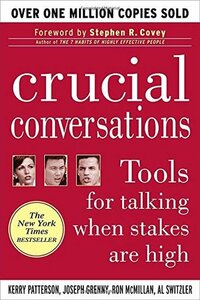Take a photo of a barcode or cover
702 reviews for:
Crucial Conversations: Tools for Talking When Stakes Are High
Ron McMillan, Kerry Patterson, Al Switzler, Joseph Grenny
702 reviews for:
Crucial Conversations: Tools for Talking When Stakes Are High
Ron McMillan, Kerry Patterson, Al Switzler, Joseph Grenny
I think due to the age and proliferation of the strategies in this work, it didn’t have the transformative punch it once may have had.
A useful guide into stopping and examining pre-programmed responses before they happen and how you can learn to more clearly and effectively communicate.
If only I could easily do what I read! Must read for communicating at home and at work! My sister had us read it in our book group. Excellent.
Some good tips for discussing tough topics head-on in a constructive way.
Overall not a bad read. I can’t say I learned anything new, but sometimes these books provide value by simply making you think about the things you already know and how you may be able to better apply them.
It’s a book I would not hesitate to recommend to a new manager or someone struggling to communicate effectively.
It’s a book I would not hesitate to recommend to a new manager or someone struggling to communicate effectively.
informative
reflective
slow-paced
UPDATED 1/9/14: So, that self-evaluation? I'm not sure how it's necessary. There's plenty to be gained from the examples of communication gone awry, and methods for getting it back on track. I wish there'd been fewer acronyms and more examples; so far, my favorite book on communication (by FAR) is How to Talk So Children Will Listen (And Listen So Children Will Talk). Also, this is nutrient-dense—I'm guessing most of us would need a long time working this material, tool by tool, to get serious value out of it. The authors discuss this, and come up with sort of a plan for doing just that, or maybe more of a mindset for approaching integrating the material into conversations. No substitute for action!
All in all, though, a great alternative to Nonviolent Communication, if you want one. The concepts are very similar (finding common ground first, "holding the space", and so on), but the examples are a little hipper and more relevant, and there is zero horrible poetry.
OLD BIT FROM WHENEVER I PUT IT DOWN THE FIRST TIME: This was shaping up as a terrific book on communication, living up to the praise heaped upon it by two dramatically different sources, both of whom I respect and admire for their work in this area. But I hit one of those self-evaluation thingies and it stopped me cold: I have a really hard time with honest and accurate self-evaluation in areas that bump up against my distorted self-image. So back to the stack it goes, to tackle another day, when I have more self-understanding (and compassion) under my belt.
All in all, though, a great alternative to Nonviolent Communication, if you want one. The concepts are very similar (finding common ground first, "holding the space", and so on), but the examples are a little hipper and more relevant, and there is zero horrible poetry.
OLD BIT FROM WHENEVER I PUT IT DOWN THE FIRST TIME: This was shaping up as a terrific book on communication, living up to the praise heaped upon it by two dramatically different sources, both of whom I respect and admire for their work in this area. But I hit one of those self-evaluation thingies and it stopped me cold: I have a really hard time with honest and accurate self-evaluation in areas that bump up against my distorted self-image. So back to the stack it goes, to tackle another day, when I have more self-understanding (and compassion) under my belt.
I had to read this for my mental health course, and while it does feel slightly outdated in the examples, the ideas of how to maneuver crucial conversations are still relevant and effective, and I feel even the most masterful conversationalists can learn something. My only issue is that I wish they had a small chapter or more disclaimers addressing situations where having these conversations will not work, such as dealing with narcissists. I know it’s an older book, but I do think it’s important to remember that you are not a failure at conversation if there are some people who are unwilling to communicate. However, I also know that may be out of the scope of the book, but I do feel that Crucial Conversations gives the impression that these strategies should work 100% of the time, when realistically there are some more nuanced situations, even if they are few.
challenging
informative
inspiring
reflective
medium-paced
hopeful
informative
inspiring
reflective
medium-paced

